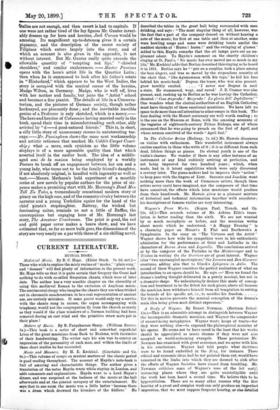Music and Manners. By H. E. Krehbiel. (Constable and Co.
6s.)—This volume of essays on musical matters of the classic period is good reading throughout. The account of Haydn's note-book is full of amusing and characteristic things. The author gives a translation of the notes Haydn wrote while staying in London, and adds comments and explanations. Haydn went to a Lord Mayor's dinner, and was surprised at the badness of the music at the ball afterwards and at the general savagery of the entertainment. He says that in one room the music was a little better"because there was a dram which drowned the blunders of the fiddlers." He described the tables in the great ball being surrounded with men drinking, and says : "The most singular thing of all, however, was the fact that a part of the company danced on without hearing a note of the music, for first at one table and then at another, some were howling songs and some were drinking toasts amidst the maddest shrieks of Hurra hurra l' and the swinging of glasses." Added to this, Haydn remarks that the oil lamps gave out an un- pleasant odour. To Haydn's comment on the charity children's singing. at St. Paul's, No music has ever moved me so much in my life," Mr. Krehbiel adds that Berlioz described this singing as he heard it in 1851. Berlioz says he "'put on a surplice, took a place among the bass singers, and was so moved by the stupendous sonority of the choir that, "like Agamemnon with his toga," he hid his face behind his music-bock: Daprez, the tenor, who was also present, grew terribly excited. • I never saw Duprez in such a state. He stammered, wept, and raved.' J. B. Cramer was also present, and, rushing up to Berlioz as he was leaving the Cathedral, shouted : Cosa stupenda ! Stupenda ! La gloria dell' Inghilterre " One wonders what the clerical authorities of an English Cathedral must have thought of these emotional musicians. We have left no space to do more than call attention to other essays in this book. The four dealing with the Mozart centenary are well worth reading ; so is the one on the Museum at Bonn, with the amusing accounts of the vagaries of eighteenth-century Prince Bishops, one of whom announced that he was going to preach on the first of April, and whose sermon consisted of the words "April fool."






































 Previous page
Previous page